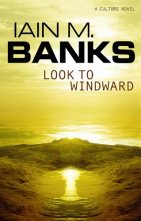This review has no spoilers with the exception of one potentially spoilerish section towards the end, but I’ll give warning when we reach that paragraph.
With each new Banks novel I read, and especially with each Culture novel, I become sadder he’s gone. I only started reading him after he had already died and I’m gutted that I’ll never get to feel the anticipation or excitement of waiting for his next book to be published. On the positive side, though, he’s left behind such an immense body of work that four novels in and I’m not even halfway through the Culture stories yet.
On the positive side, though, he’s left behind such an immense body of work that four novels in and I’m not even halfway through the Culture stories yet.
As I discussed in my Use of Weapons review, the only way the Culture have been able to find purpose in their hedonistic (arguably decadent) lives is by interfering in other civilisations in an genuine attempt to help make things better- the Culture practice a benevolent kind of imperialism. Look to Windward deals with the consequences of a Culture interference gone horrendously wrong; their attempt to interfere in a world named Chel led to a civil war of unprecedented brutality which resulted in the death of over four billion Chelgrians. The war only stopped when the Culture admitted that they had inadvertently caused it through their manipulation.
Look to Windward contains some of the most beautiful and poetic imagery conjured up by Banks yet. For example, the light of two supernovae which destroyed entire solar systems and the billions of lives they sustained (caused by the Idiran-Culture War fought over eight centuries ago) is only now reaching the Culture world Masaq, and so the Culture’s attempts to make amends for their disastrous interference in Chelgrian politics takes place against the backdrop of this “light of ancient mistakes.”
Regarding themes, this is perhaps the most anti-Culture of the Culture novels. It asks tough questions, touched upon but never quite fully explored in the other novels, about if the Culture is right in their interventionist policies and whether or not the Culture’s human civilians (endlessly apologetic about their mistakes but ultimately complicit in these imperial policies) may be considered just as responsible for the decisions of the Culture’s Minds and therefore legitimate targets for retaliation.
These questions are asked by Quilan, a Chelgrian soldier sent to Masaq’ on a revenge mission for causing the Chelgrian civil war. Banks likes to instil heroic, or at least sympathetically human, characteristics in his ‘villains’, and Quilan is no different. The details of his revenge mission against the Culture is gradually revealed and despite its heinousness Quilan himself is presented as courageous and loyal. He may even be considered the unambiguous hero of the novel by vehemently opposed to the Culture’s own-brand of imperialism.
As the full details of Quilan’s mission are only made apparent later in the book it may be a spoiler to mention it so I won’t- but the backstory is very intriguing. It involves a real-life Chelgrian ‘heaven’ created by a subset of the population who have ‘Sublimed’. Sublimation is a vague process by which sentient beings leave the physical world to live on some higher plane of existence. It’s an interesting subplot and I’m excited to read more about the process of Sublimation, which is the focus of The Hydrogen Sonata (Culture #10).
Look to Windward is teeming with several other wonderful world-building subplots and themes. One main theme deals with the attitudes of human Culture citizens towards death. Does it constitute ‘cheating’ that so many engage in extreme sports and other deadly pastimes in Virtual Reality and in real-life (but with individual personalities safely backed-up should ‘body-death’ occur)? Should this blasé approach to death be considered decadent in a society which has effectively eliminated all threat of real death in their daily lives? Is it especially distasteful for them to engage in such hobbies when Culture interference just caused billions of real deaths in another, less privileged civilisation?
Here’s that spoiler warning I promised at the start, though it only relates to a subplot of the book:
If Look to Windward has one drawback it would be the subplot of a Culture citizen who finds out about the Chelgrian revenge plot and attempts to warn the Culture of it. This storyline ultimately it doesn’t go anywhere and I’m not sure why it was included. Perhaps it was to highlight the futility of human citizens in the Culture doing anything important when a Mind could do it much more quickly and effectively? This doesn’t seem a strong enough reason to me. Though this sequence is set on one of the most fantastically imaginative worlds in the series so far it still amounted to unwelcome interruptions to the more interesting main story.
End of potential spoilers.
Furthermore, Iain Banks is a big fan of his twist endings and they work more often than not in his Culture books, but this one felt superfluous to me.
Nonetheless, I could easily have started rereading Look to Windward the moment I put it down. It’s rich, imaginative, sprawling, challenging, funny and exciting. The sheer scope is outrageous; Look to Windward the very definition of space opera.
On a final note, I listened to this story as an audiobook (my first ever unabridged one, in fact). The narrator, Peter Kenny, brought this story to life in a way I would never have imagined.

Sounds really interesting
As most of my blog posts so far have just been me fawning over this series you can probably already tell that I highly recommend getting into it!